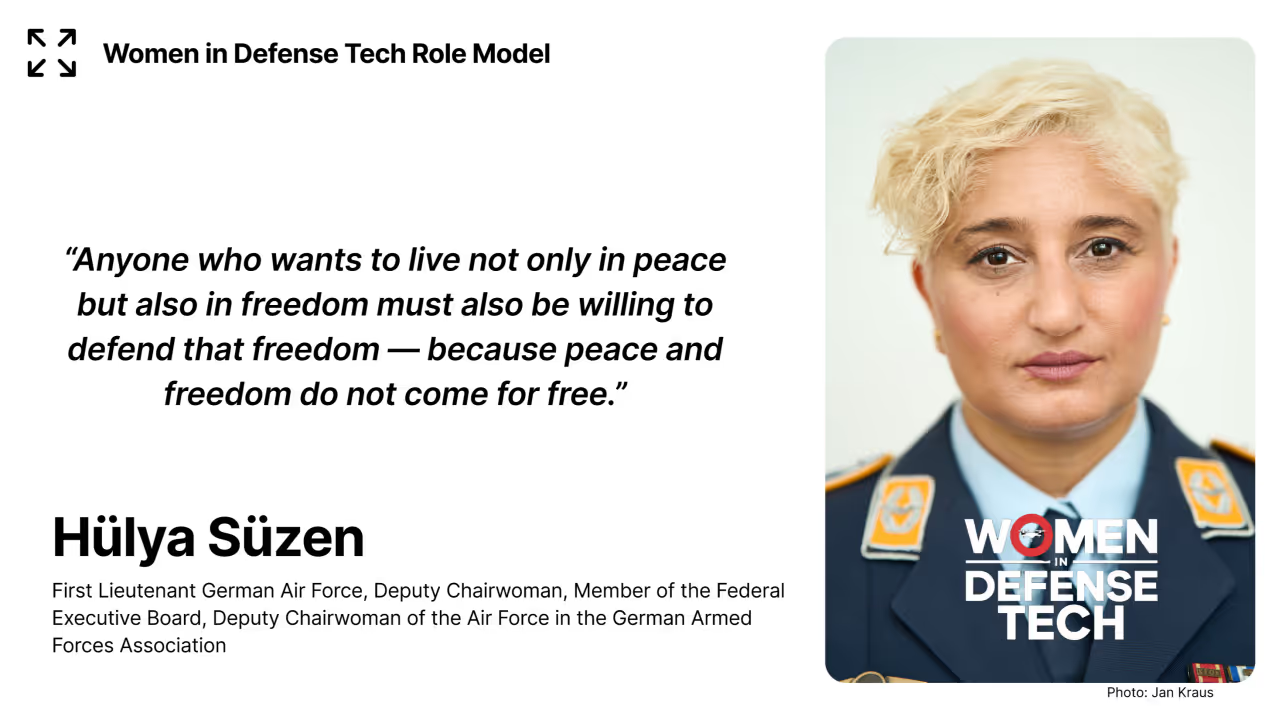What drove your decision to join the German Air Force?
Hülya Süzen: I have always been fascinated by aviation and space. The fact that humans have managed to overcome gravity and fly is, for me, the best proof that we can achieve anything if we truly set our minds to it. This idea still motivates me today in my daily life and drives me to always give my best.
I always wanted to join the Bundeswehr — the duty to serve our country, the camaraderie, and the clarity of mission attracted me from an early age. And because I love all kinds of aircraft, the Air Force was naturally my first choice. Even though my path didn’t lead me there directly. I initially served in the Army uniform within the medical service, where I gathered important experience. Later, through a change in career track and assignment, so I made my way into the Air Force. Today, I see that as a great strength — because I know the Bundeswehr from different perspectives and can carry out my duties as an Air Force officer with a broader range of experience.

In earlier interviews you mention that you wanted to be a knight – what gives you the sense of virtue and purpose today, now that you are an embodiment of modern knightliness?
Hülya Süzen: For me, this is clearly embodied in the oath taken by all Bundeswehr soldiers: “I swear to faithfully serve the Federal Republic of Germany and to bravely defend the rights and freedom of the German people, so help me God.” This oath differs fundamentally from those in other public services — for example, the police — because it explicitly demands bravery. In this oath, all the core virtues are contained that also shaped the classical image of a knight: courage, loyalty, bravery. It’s about selflessly and with full commitment standing up for the rights and freedom of our country and our fellow citizens. I can’t imagine a stronger symbol for modern knightliness. In my eyes, there’s hardly anything more “knightly” than this. This awareness accompanies me every day as an Air Force officer, gives me meaning and orientation, and reminds me that our task goes far beyond just being a job.
The Bundeswehr is the reflection of society – which societal status quo do you see being reflected in the Armed Forces right now?
Hülya Süzen : The Bundeswehr is indeed a mirror of our society — and as a solider, I see this veryclearly in many areas. In one of my earlier positions, I worked at the Central Contact Point for Soldiers of Other Faiths (ZASaG) at the Leadership development and Civic education centre (Zentrum Innere Führung / ZInFü). There, soldiers with different religious backgrounds, worldviews, and sexual orientations would reach out daily. There were more than twelve different religions represented, beyond just Catholic and Protestant military chaplaincy. This work clearly showed me how diverse the Bundeswehr has become — and that this diversity is a great strength for us as armed forces.
However, there’s a crucial difference from civilian society: in the Bundeswehr, through the uniform, we already have a clearly defined common value compass. This is firmly based on the principles of our free and democratic order, which we are sworn to defend with our lives. This gives us clear orientation about who we are and what we stand for. Diversity for us does not mean randomness — on the contrary: it’s embedded in a strong common foundation. Today we see those societal issues — equality, diversity, acceptance, individual life choices — have also arrived within our ranks. Of course, as in society, we also face tensions and challenges when different viewpoints meet. But our shared mission, our values, and our sense of camaraderie unite us all.
Is relatability an inherent part of good leadership for you – especially thinking of soldiers with a migration background?
Hülya Süzen : Of course, relatability is a key part of good leadership for me — it’s firmly anchored in the Bundeswehr’s concept of Innere Führung (Inner Leadership). InnerLeadership means that we don’t just give orders but take responsible care of the people entrusted to us. It’s about not just facing soldiers as a superior, but standing alongside them, taking them seriously, knowing their concerns, and supporting them in the Bundeswehr, we speak of “leading from the front” and “leading by example”: I have to personally live the behavior I expect from my troops — only can I build credibility. This includes the duty of comradeship, meaning mutual support, and the duty of care as a superior, ensuring the physical and psychological well-being of my soldiers.
In the Bundeswehr, we rely heavily on mission-type tactics: I set the task and the intent, but the subordinates often decide independently how to achieve the goal. For that to work, I must be close to my troops, know their strengths, weaknesses, and limits, and build trust. Specifically, regarding soldiers with a migration background: for me, Inner Leadership also means recognizing and purposefully leveraging diversity. Everyone brings individual strengths and weaknesses, and as a military leader, it’s my task to deploy these for the benefit of the unit. Soldiers with a migration background often bring language or cultural skills that can significantly benefit the unit — for example, in foreign deployments, when dealing with local populations or understanding cultural contexts. Diversity is not a hindrance but a strategic advantage when we use it correctly.
Military service requires a sense of responsibility for the common good – a vague democratic value that is hard to dictate top-down. How can Germany rebuild trust with the younger generation?
Hülya Süzen: Service in the Bundeswehr demands a high degree of responsibility for the common good — and that truly cannot be simply commanded “from above.” This democratic value has to be lived and demonstrated to be authentic. Many soldiers I know are helpful, sincere, and caring people who take on responsibility every day — not just in service but also as members of society. I believe Germany can regain the trust of the younger generation if we, as a society, communicate more clearly and honestly about what we stand for, what is at stake, and why it is important to take on responsibility. Many young people today feel that politics and institutions are distant, that their concerns go unheard, and that there’s no way for them to meaningfully contribute. We need to change that. We must make it clear: everyone can and should do something for the common good. Every contribution counts — big or small.
As the Bundeswehr, I see us in a special role here: we must show even more clearly who we are, what we stand for, and that service with us is not blind obedience but is rooted in a strong foundation of values — in the defense of freedom, democracy, and the rule of law. When we convey that being a soldier means actively standing up for society, and that each individual with their strengths is needed, we create closeness and trust.
I believe, for example, that a general national service obligation can trigger exactly this — if it’s properly designed. It’s not just about military service, but about sending a societal signal: every young person gets the chance to take on responsibility, whether in the Bundeswehr, in social work, in disaster relief, or elsewhere. This can create a sense of being part of something bigger, of being needed, and of making a tangible contribution to the common good. This strengthens not only trust in the state but also the overall cohesion of society.

.svg)

